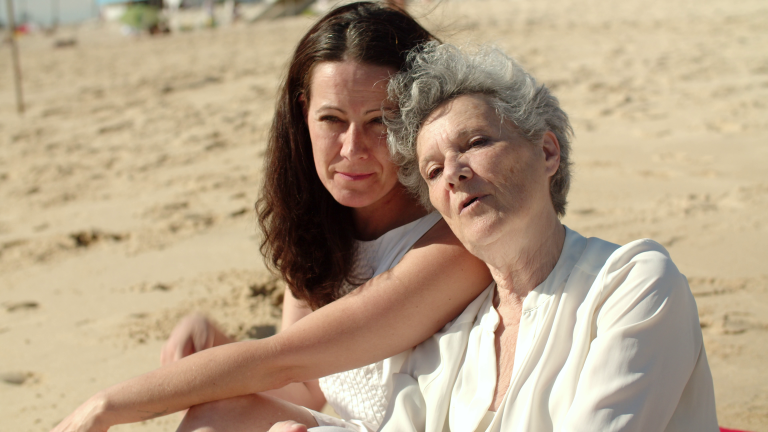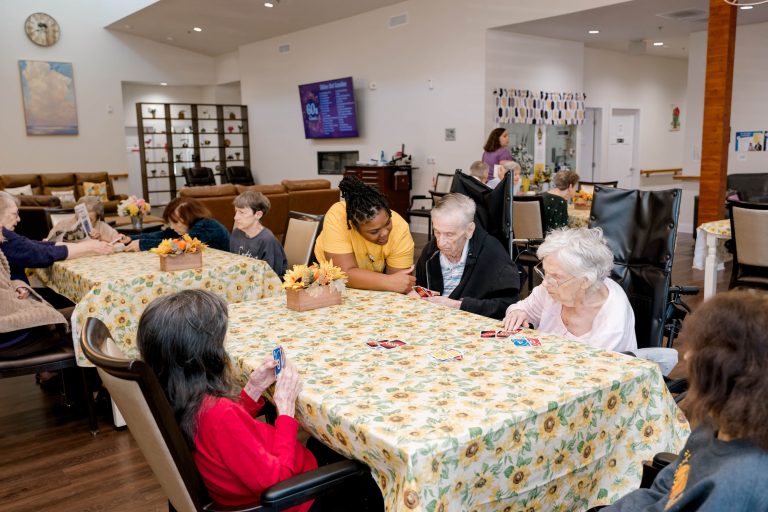When to Consider Dementia Care for Your Loved One
If you notice your loved one consistently forgetting recent conversations or appointments, struggling with everyday tasks like eating, bathing, and dressing, or exhibiting sudden outbursts of agitation, it may be time to contemplate dementia care. Changes in demeanor, loss of interest in activities, and confusion about surroundings are also red flags. As their independence declines and safety concerns rise, shifting to a specialized care setting can provide the necessary support and security. For more insights on how to navigate this shift, look into the specific signs, safety measures, and benefits of memory care communities.
Key Takeaways
- Significant Memory Loss and Cognitive Decline: Frequent memory lapses, such as forgetting recent conversations or appointments, and struggles with planning or problem-solving indicate the need for dementia care.
- Impact on Daily Living Activities: Struggles with basic tasks like eating, bathing, and dressing, along with declining independence, suggest a transition to specialized care.
- Behavioral Changes and Safety Concerns: Sudden outbursts, agitation, confusion about surroundings, and risks of wandering or accidents necessitate a secure and supportive environment.
- Increased Care Needs: Marked changes in demeanor, loss of interest in previously enjoyed activities, and frequent misplacing of items signal increased care requirements.
- Medical and Functional Assessments: A formal diagnosis of a memory-related condition and thorough assessments of physical, emotional, and cognitive needs are crucial for determining the appropriateness of dementia care facilities.
Recognizing Behavioral Changes

When do you know that the behavioral changes in a loved one with dementia are significant enough to think about moving them to a care home? Look for behavioral indicators such as sudden outbursts, agitation, or a marked change in their usual demeanor. If your loved one, who was once calm and composed, starts acting out or becoming easily frustrated, it may be a sign that their dementia has progressed.
Also, pay attention to changes in their emotional responses. For instance, if they show a loss of interest in activities they once enjoyed, forget important details like birthdays or anniversaries, or exhibit confusion about their surroundings, these are clear signs that their care needs are escalating. These changes can indicate that they require the specialized support and structured environment that a dementia care facility can provide. Additionally, a low caregiver-to-resident ratio of 1:5 to 1:8 can ensure that their specific needs are met with personalized attention.
Signs of Memory Loss and Cognitive Decline
How can you tell if your loved one's memory loss and cognitive decline are severe enough to warrant a move to a dementia care facility? Look for significant memory lapses, such as forgetting recent conversations, important appointments, or familiar tasks like making a cup of tea. Cognitive impairment may manifest as taking longer to retrieve information, struggling to find the right words, or getting lost in familiar surroundings. Other signs include losing or misplacing items frequently, such as keys or glasses, and difficulty with planning or solving problems, like managing finances or following a recipe. If your loved one is experiencing these symptoms consistently, it may indicate a need for specialized care to support their daily living and guarantee their safety. Furthermore, as over 9 million Americans currently live with some form of dementia, recognizing these signs early can lead to timely intervention and support.
Impact on Daily Living Activities

As dementia progresses, it greatly impacts your loved one's ability to perform activities of daily living (ADLs). You might notice struggles with basic tasks like eating, bathing, and dressing. Daily routines that were once manageable can become overwhelming, as dementia affects executive functioning, memory, judgment, attention, and spatial memory.
Your loved one may become easily distracted, struggle with concentrating, or have a short attention span, making it harder to complete tasks. Independence levels will likely decline, as they may need help with personal care, such as washing, brushing their teeth, and managing their hair. Evaluating their current abilities and needs is vital to tailor support strategies that maximize independence while ensuring safety and comfort. Simplifying their environment and involving them in decision-making can also help maintain their sense of autonomy and dignity. Additionally, consider specialized memory care options that provide personalized care plans to enhance their quality of life.
Safety and Security Concerns
Safety and security concerns become increasingly important as dementia progresses, posing significant risks to your loved one's well-being. To guarantee their safety, it's essential to address potential hazards in the home environment. For instance, implement fall prevention measures such as securing handrails in stairwells, placing grab bars in tubs and showers, and removing tripping hazards like throw rugs and extension cords.
Wandering risks are also a significant concern. People with dementia may wander due to disorientation or restlessness, which can lead to injuries or getting lost. To mitigate this, keep a close eye on your loved one, especially during periods of high activity like meal times or shift changes. Consider installing locks out of sight and removing access to hazardous items like car keys, tools, and firearms.
Regularly reassess your loved one's ability to make safe decisions as their condition evolves. As dementia progresses, professional care options such as assisted living & memory care can provide a secure environment tailored to their specific needs.
Emotional and Physical Strains on Caregivers

Caring for a loved one with dementia can be overwhelmingly demanding, both emotionally and physically. You may experience caregiver burnout, a state of emotional exhaustion that can lead to depression, anxiety, and physical health issues. The constant stress of managing your loved one's needs can result in feelings of frustration, anger, and hopelessness. You might find yourself withdrawing from social activities, feeling irritable, and struggling with sleep and concentration.
It's essential to recognize the signs of emotional exhaustion, such as heightened anxiety, cynicism, and a lowered level of patience. Taking short breaks each day to care for your own needs can help mitigate these effects. Implementing strategies like focusing on positive emotions and seeking support from family, friends, or professional resources can also alleviate some of the burden. Many families have found that engaging with Caring Stars Award communities can provide invaluable support and guidance during these challenging times.
Benefits of Memory Care Communities
Moving your loved one to a memory care community can greatly alleviate the emotional and physical strains you've been enduring as a caregiver. These communities offer specialized support and care tailored to the unique needs of individuals with dementia or other memory-related conditions. You can expect personalized care plans that recognize and address your loved one's specific needs and preferences, ensuring they receive thorough and individualized support.
Memory care communities also foster a supportive social environment, encouraging social engagement through activities like music therapy, art classes, and group meals. This social interaction helps reduce feelings of isolation and improves overall mental health. Additionally, these communities provide a safe and secure environment, minimizing risks such as wandering or accidents, and promoting a sense of comfort and familiarity for your loved one. Furthermore, the focus on creating a new home away from home enhances the living experience for residents.
Initiating the Conversation and Transition Process

When do you know it's time to have the difficult conversation about changing your loved one to a memory care community? This conversation is essential and should be approached with care. Choose a calm and quiet time to talk, avoiding moments when your loved one is confused, agitated, or distracted.
Express empathy and compassion, validating their emotions and concerns. Be honest and clear about the reasons for considering memory care, focusing on their well-being and safety. Involve your loved one in the decision-making process as much as possible to maintain their sense of autonomy and control.
Effective communication strategies are key. Use clear and simple language, and consider their communication style. Family involvement is also important; engage family members in discussions and decision-making to promote a smoother change and better outcomes.






